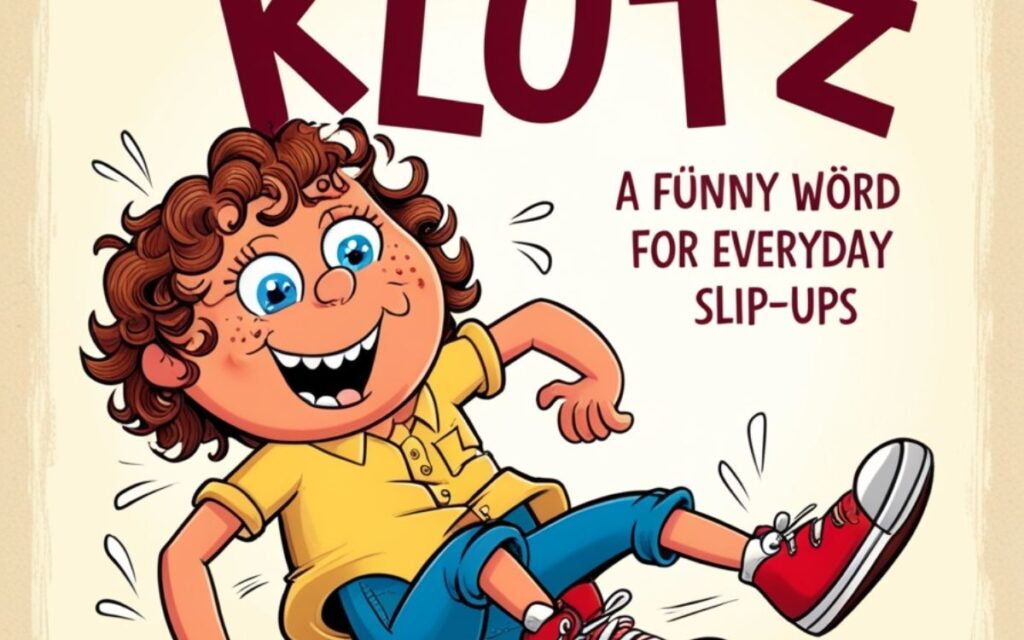A klutz is a person who often drops things or bumps into objects. It means someone who is a bit clumsy in daily life. The word is friendly and used to describe simple, funny accidents that happen to almost everyone.
The origin of this word comes from Yiddish and German roots. In Yiddish, “klots” means a wooden block. This old meaning helps explain why the word describes people who move in a stiff or awkward way, just like a block of wood.
In real-life examples, a klutz might spill juice on the table or trip over a shoe. These small mistakes are not bad; they show how human we all are. Being a little clumsy makes people relatable and kind-hearted.
Klutz Meaning in Plain English
A klutz is a person who often trips, spills, or drops things. It describes someone who moves in a funny or awkward way. The word sounds friendly and shows simple mistakes that happen in everyday life.
People use klutz to talk about small accidents with kindness. It reminds everyone that no one is perfect. Sometimes clumsy moments make life fun and real, showing that even little slips can bring smiles and laughter.
Standard Definitions
| Source | Definition |
| Merriam-Webster | A clumsy person |
| Oxford Dictionary | A clumsy, awkward, or foolish person |
| Cambridge Dictionary | Someone who often drops things or falls over |
Real-Life Example
A klutz may drop a cup of water or trip while walking. These little moments happen to everyone. They show how people can make small mistakes and still laugh about them afterward. It makes daily life light and natural.
In stories or movies, a klutz often spills coffee or bumps into a friend. These funny accidents make characters more real and likable. Such moments remind us that being clumsy sometimes is normal and perfectly fine.
See also : Lozenger or Lozenge: Correct Spelling and Usage Guide
Where the Word “Klutz” Came From
The word klutz began from the Yiddish word “klots,” which means a wooden block. It came into English through families who spoke Yiddish and lived in big American cities many years ago.
People started using klutz to describe someone who moved awkwardly, like a block of wood. Over time, the word became gentle and friendly. Now, it shows simple clumsy actions that make people seem funny and real.
Etymology Breakdown
| Language | Word | Meaning |
| Yiddish | klots | Wooden block; awkward person |
| German | Klotz | Lump or block |
Immigrant Influence
The word klutz grew popular because of Jewish immigrants who spoke Yiddish. They brought their language to cities like New York, where English speakers began using the word in daily conversations to describe funny or awkward actions.
Through time, klutz became part of American speech. Immigrants shared their words, stories, and humor, which shaped the way people spoke. This mix of cultures helped the language grow warmer, friendlier, and full of character.
How “Klutz” Entered English Usage

The word klutz started appearing in American English during the early 1900s. It spread quickly in cities where Yiddish-speaking families lived. Writers and comedians used it to describe funny mistakes and clumsy actions that made people laugh.
Over time, klutz became common in books, movies, and jokes. It turned into a light-hearted word that people used kindly. Its simple sound and cheerful meaning helped it stay in everyday speech for many generations.
Historical Timeline
- Early 1900s: The word klutz was used in Yiddish-speaking homes to describe someone awkward or clumsy.
- 1930s: It began appearing in English through Jewish writers and performers in big American cities.
- 1940s–1950s: Klutz gained fame through radio shows, newspapers, and comedy acts.
- 1970s: The word became common in movies, cartoons, and sitcoms, showing light humor.
- Today: Klutz remains a friendly word used worldwide to describe small, clumsy mistakes.
The Evolution of the Word “Klutz”
At first, calling someone a klutz was more serious – implying they were unskilled or inept. Over time, the word mellowed out.
Old vs. Modern Usage
| Time Period | Tone | Implication |
| Early 1900s | Mild insult | Inept, socially or physically |
| 1950s–1980s | Comedic | Lovable, clumsy |
| Today | Endearing/Neutral | Accident-prone, but not offensive |
Words Related to Klutz and What They Actually Mean
Not all clumsy people are created equal. Here’s a look at other words that are similar to “klutz” – but each with its own flavor.
See also : Happy Holiday or Happy Holidays? Key Differences Explained
Synonyms Table
| Term | Connotation | Usage Example |
| Oaf | Big, dumb, and clumsy | “He’s such an oaf – he broke the chair!” |
| Butterfingers | Drops things frequently | “She has butterfingers when she’s nervous.” |
| Bumbler | Awkward in speech or action | “He’s a bit of a bumbler, but he means well.” |
| Clod | Dull-witted and clumsy | “Don’t be a clod – watch where you’re going!” |
| Goofball | Silly, lighthearted fool | “You’re such a goofball sometimes.” |
Traits Often Associated With a Klutz
Contrary to popular belief, being a klutz doesn’t mean you’re broken. It just means your brain and body don’t always sync up perfectly.
Common Traits
- Frequent accidents: A klutz often drops, spills, or bumps into things easily.
- Poor balance: They may trip or stumble when walking or moving quickly.
- Easily distracted: Small lapses in focus can lead to clumsy moments.
- Unsteady hands: Tasks needing careful control, like pouring or writing, feel tricky.
- Good-natured humor: Most klutzes laugh at themselves and stay cheerful after mistakes.
The Psychology Behind Being a Klutz
Why are some people more prone to knocking over glasses or walking into door frames?
Brain-Body Disconnect
- Slow coordination: The brain sends signals, but the body reacts a bit late.
- Distraction: Losing focus can cause small slips, like bumping into objects.
- Tiredness: When someone feels tired, movements become less controlled.
- Stress impact: Worry or tension can make the body respond awkwardly.
- Growth changes: Children or teens may appear clumsy while their bodies adjust and grow.
Klutz in Pop Culture

Hollywood and sitcoms love a klutz. Characters who stumble, fumble, and tumble often win hearts – and laughs.
Famous Klutzes in Fiction
| Character | Show/Movie | Why They’re Memorable |
| Lucille Ball | I Love Lucy | Physical comedy legend |
| Rachel Green | Friends | Dropped trays, tripped over her own feet |
| Steve Urkel | Family Matters | Signature catchphrase: “Did I do that?” |
| Michael Scott | The Office | Clumsy and clueless |
| Bridget Jones | Bridget Jones’s Diary | Self-deprecating charm |
Examples of “Klutz” in Real Sentences
Using the word “klutz” is as natural as saying “oops.” Here are a few ways it shows up in casual conversation:
In Everyday Life
- Spilling drinks: A klutz might knock over a glass while reaching for something.
- Dropping items: Phones, pens, or keys often slip right out of their hands.
- Tripping: Uneven floors or steps can easily cause funny stumbles.
- Bumping into things: They may walk into doors or furniture without noticing.
- Small accidents: Everyday clumsy moments bring laughter and remind us everyone slips sometimes.
In Jokes
- Playful teasing: Friends often call someone a klutz after a harmless mistake.
- Funny reactions: People laugh when small accidents turn into cheerful moments.
- Light humor: Jokes about clumsiness make situations less serious.
- Shared laughter: Everyone enjoys laughing together over simple slips.
- Kind tone: Using klutz in jokes keeps the mood friendly and gentle.
How Different Cultures View Clumsiness
While English has “klutz,” other languages offer their own takes:
Cross-Language Comparison
| Language | Term | Translation |
| French | gauche | Clumsy (also means left) |
| Spanish | torpe | Clumsy, awkward |
| German | tollpatsch | Bumbler, clumsy person |
| Japanese | bukiyou | Unskilled, awkward |
| Italian | maldestro | Clumsy or ungraceful |
Social Implications of Calling Someone a Klutz
“Klutz” walks a fine line between playful teasing and potential embarrassment. Tone and context matter.
When It’s OK
- Among friends: Using klutz with close people feels light and playful.
- Self-talk: Saying it about yourself shows humor, not shame.
- Funny moments: It fits small accidents that cause laughter, not harm.
- Warm tone: The word sounds kind when spoken with care.
- Casual settings: It works well in relaxed chats, not formal situations.
When It’s Not
- Serious settings: Avoid using klutz in workplaces or formal meetings.
- Mocking tone: It hurts when said to embarrass or tease someone.
- Public mistakes: Using it after big errors can sound rude or dismissive.
- Health issues: Never use it for someone with real coordination problems.
- Unkind humor: If laughter feels mean, the word becomes offensive instead of funny.
Workplace Clumsiness: Do Klutzes Get Judged?
Unfortunately, yes. Clumsiness can sometimes be misread as carelessness, especially in high-stakes environments.
Tips for Handling It at Work
- Stay calm: If a klutz moment happens, smile and move on confidently.
- Be mindful: Focus on your surroundings to avoid small accidents.
- Keep organized: A tidy desk helps prevent spills or dropped items.
- Avoid labeling: Don’t call yourself clumsy during meetings or interviews.
- Practice control: Simple exercises improve hand-eye coordination and confidence.
Everyday Klutz Moments Everyone Can Relate To
Let’s face it, we’ve all been there.
Common Klutz Scenarios
- Tripping on stairs: A klutz might miss a step while hurrying.
- Spilling drinks: Coffee or juice often ends up on clothes or tables.
- Dropping phones: Devices slip from hands at the worst moments.
- Bumping into objects: Doors, chairs, or corners seem to appear suddenly.
- Misplacing things: Keys, pens, or glasses vanish even when they’re right nearby.
Why the Word “Klutz” Has Staying Power
Short. Sharp. Specific. The word “klutz” works because it nails the concept in one syllable. And it does so without being too harsh or judgmental.
- Simple sound: The word klutz is short, catchy, and easy to remember.
- Friendly meaning: It describes clumsiness with humor, not insult.
- Cultural roots: Its Yiddish origin gives it warmth and history.
- Everyday use: People relate to small accidents in daily life.
- Timeless charm: It reminds everyone that imperfection can be funny and human.
Final Thoughts
The word klutz shows that small mistakes are a natural part of life. It reminds people that dropping things or stumbling sometimes does not make anyone less smart or capable. Everyone experiences such funny moments.
Using klutz brings warmth to language and helps people laugh at themselves kindly. It turns simple accidents into gentle humor. This friendly word teaches that being imperfect can still be charming and completely normal.
FAQs
What does being a Klutz mean?
Being a klutz means someone who is clumsy, often drops things, trips, or bumps into objects in a funny, harmless way.
Is it Klutz or clutz?
The correct spelling is Klutz, not clutz. It comes from Yiddish and German roots meaning a wooden block or clumsy person.
What is Klutz in Pokémon?
In Pokémon, Klutz is an ability that stops a Pokémon from using held items during battle, adding challenge and strategy.
Is Klutz a rude word?
No, klutz isn’t rude. It’s usually used playfully or kindly to describe someone’s small, funny mistakes or clumsy actions.

Join Bibcia on a journey to master English grammar. Discover easy lessons, writing tips, and practical examples designed to make learning grammar simple and effective.










